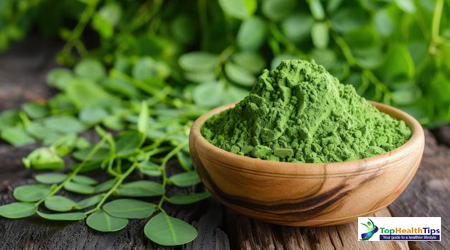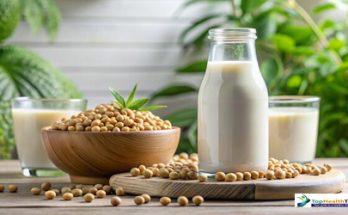Introduction
Moringa, often referred to as the “Miracle Tree,” is a nutrient-rich superfood that has been used for centuries in traditional medicine. It offers a multitude of health benefits, thanks to its impressive content of vitamins, minerals, antioxidants, and anti-inflammatory compounds. Known for its ability to promote overall wellness, moringa is a natural powerhouse that supports energy levels, strengthens the immune system, and aids in disease prevention.
In this article, we will explore the science-backed health benefits of moringa and how it can enhance your well-being.
Table of Contents
- Nutritional Profile of Moringa
- Boosts Immune System
- Supports Heart Health
- Regulates Blood Sugar Levels
- Enhances Digestive Health
- Promotes Healthy Skin and Hair
- Anti-Inflammatory and Antioxidant Properties
- How to Incorporate Moringa into Your Diet
- Scientific Evidence Supporting Moringa Benefits
- Conclusion
Nutritional Profile of Moringa (Per 100 grams)
Source: USDA National Nutrient Database
| Nutrient | Amount per 100g | % Daily Value (DV) |
|---|---|---|
| Calories | 64 kcal | 3% |
| Protein | 9.4 g | 19% |
| Total Fat | 1.4 g | 2% |
| Carbohydrates | 8.3 g | 3% |
| Dietary Fiber | 2.0 g | 8% |
| Sugars | 0.6 g | – |
| Vitamin A (Beta-carotene) | 378 µg | 42% |
| Vitamin C | 51.7 mg | 57% |
| Vitamin E | 3.2 mg | 21% |
| Vitamin B6 | 1.2 mg | 71% |
| Calcium | 185 mg | 14% |
| Magnesium | 147 mg | 35% |
| Iron | 4.0 mg | 22% |
| Potassium | 337 mg | 7% |
| Phosphorus | 112 mg | 16% |
| Zinc | 0.6 mg | 5% |
Highlights of Moringa’s Nutritional Benefits:
- Rich in Protein: Moringa provides 9.4g of protein per 100g, making it a plant-based protein source, which is especially beneficial for vegetarians.
- High in Vitamin C: With 57% of the Daily Value, moringa is a great source of vitamin C, boosting immune function and skin health.
- Vitamin A: Moringa contains high amounts of beta-carotene, which the body converts into vitamin A, supporting vision and skin health.
- Iron-Rich: Providing 22% of the daily iron requirement, moringa helps in preventing anemia.
- Calcium and Magnesium: Moringa is an excellent source of these essential minerals, important for bone health and muscle function.
The data shows how nutrient-dense moringa is, making it a powerful superfood for daily nutrition.
Boosts Immune System
One of the most notable benefits of moringa is its ability to boost immune function.
- Rich in Vitamin C: Moringa contains high levels of vitamin C, which is essential for maintaining immune health.
- Antioxidants: Moringa’s antioxidants protect cells from oxidative stress, reducing the risk of chronic diseases.
- Anti-inflammatory Effects: Chronic inflammation weakens the immune system, but moringa’s anti-inflammatory properties can help mitigate this issue.
Scientific studies show that the phytochemicals in moringa enhance the body’s natural defense mechanisms, making it a valuable superfood for immune support.
Supports Heart Health
Moringa is beneficial for cardiovascular health in several ways:
- Lowers Cholesterol: Research has demonstrated that moringa can reduce LDL (bad) cholesterol levels, which are linked to heart disease.
- Regulates Blood Pressure: Potassium in moringa helps balance sodium levels, which can lower blood pressure and reduce the risk of hypertension.
- Anti-inflammatory Action: By reducing inflammation, moringa contributes to a healthier heart and reduces the risk of heart-related issues such as atherosclerosis.
These combined effects make moringa an excellent choice for anyone looking to improve heart health naturally.
Regulates Blood Sugar Levels
Moringa has shown great potential in helping regulate blood sugar, making it especially beneficial for individuals with diabetes or those at risk for developing the condition.
- Chlorogenic Acid: This antioxidant in moringa is known to slow the release of glucose into the bloodstream after meals.
- Isothiocyanates: Compounds in moringa have been found to stabilize blood sugar levels.
Studies have indicated that incorporating moringa into a daily routine can lead to lower fasting blood sugar and improved insulin sensitivity.
Enhances Digestive Health
Moringa has long been used to support digestive health.
- Fiber-Rich: Moringa’s high fiber content aids in digestion by promoting regular bowel movements and reducing the risk of constipation.
- Anti-Bacterial Properties: Moringa’s compounds can help fight off harmful bacteria that may cause digestive issues, such as H. pylori, which is linked to stomach ulcers.
The anti-inflammatory properties of moringa also help reduce symptoms of gastrointestinal conditions like irritable bowel syndrome (IBS) and inflammatory bowel disease (IBD).

Promotes Healthy Skin and Hair
Moringa is a popular ingredient in many skin and hair care products due to its nourishing properties.
- Rich in Antioxidants: Moringa’s antioxidants help fight free radicals, which can cause premature aging of the skin.
- Hydration: The vitamin E and fatty acids in moringa moisturize the skin and hair, leaving them smooth and hydrated.
- Wound Healing: Moringa has been used in traditional medicine to promote wound healing and reduce scarring.
Applying moringa oil directly to the skin or consuming moringa regularly can improve skin elasticity, reduce wrinkles, and promote shiny, healthy hair.
Anti-Inflammatory and Antioxidant Properties
Inflammation is a key driver of many chronic diseases, including arthritis, heart disease, and cancer. Moringa’s potent anti-inflammatory and antioxidant compounds help to:
- Reduce Inflammation: Studies suggest that moringa can significantly reduce markers of inflammation.
- Protect Cells: Moringa’s antioxidants, such as quercetin and chlorogenic acid, protect the cells from oxidative damage.
- Combat Chronic Diseases: These anti-inflammatory and antioxidant actions may help prevent the development of chronic illnesses.
Moringa’s ability to reduce inflammation and oxidative stress makes it a powerful tool in the prevention of many health conditions.
How to Incorporate Moringa into Your Diet
There are several easy ways to add moringa to your daily diet:
- Moringa Powder: Add to smoothies, teas, or baked goods.
- Moringa Capsules: Take as a supplement for a quick nutritional boost.
- Fresh Moringa Leaves: Use in salads or as a garnish for various dishes.
- Moringa Tea: Brew moringa tea for a warm, nutritious drink.
By incorporating moringa into your daily routine, you can easily enhance your overall health and wellness.
Scientific Evidence Supporting Moringa Benefits
The health benefits of moringa are supported by a growing body of scientific research:
- Immune Support: A study published in the Journal of Food Science and Technology found that moringa leaf extract boosts immune function by enhancing the production of immune cells.
- Blood Sugar Control: Research in the Journal of Ethnopharmacology highlighted moringa’s potential in reducing blood sugar levels and improving insulin sensitivity.
- Heart Health: A study in the Journal of Medicinal Food showed that moringa could lower cholesterol levels and reduce the risk of cardiovascular disease.
- Anti-Inflammatory Effects: The Asian Pacific Journal of Cancer Prevention published findings showing that moringa’s anti-inflammatory compounds can inhibit the progression of inflammatory diseases.
- Antioxidant Protection: Research from the International Journal of Molecular Sciences revealed that moringa is rich in antioxidants that protect cells from damage caused by free radicals.
These studies provide scientific validation for the many health benefits attributed to moringa.
Potential Side Effects of Moringa
- Digestive Issues
Taking high doses of moringa, particularly its leaves or seeds, may cause stomach upset, nausea, or diarrhea. This is because moringa has strong laxative properties, especially when consumed in excess. - Low Blood Pressure (Hypotension)
Moringa can lower blood pressure, which may be beneficial for some. However, individuals with naturally low blood pressure or those taking antihypertensive medications should use moringa cautiously to prevent dangerously low blood pressure levels. - Blood Sugar Drops
Moringa is known to reduce blood sugar levels. While this can be helpful for managing diabetes, it can pose a risk for people taking medications to lower blood glucose. Combining the two may result in hypoglycemia (low blood sugar). - Medication Interference
Moringa can interact with certain medications, including those for blood pressure, thyroid, and diabetes. If you’re on any prescription drugs, it’s important to consult your healthcare provider before adding moringa to your routine. - Pregnancy Concerns
Avoid consuming moringa roots or bark during pregnancy. These parts of the plant may contain compounds that could trigger uterine contractions, increasing the risk of miscarriage.
By keeping these potential side effects in mind, you can enjoy the benefits of moringa while minimizing any health risks. Always start with small doses and consult a healthcare professional if you have any concerns.

Frequently Asked Questions (FAQs) on Moringa
1. What is moringa?
Moringa, often called the “Miracle Tree” or “Drumstick Tree,” is a plant native to parts of Africa and Asia. Its leaves, seeds, and pods are rich in nutrients and have been used for centuries in traditional medicine.
2. What are the main health benefits of moringa?
Moringa is packed with essential vitamins, minerals, antioxidants, and anti-inflammatory compounds. It can help boost immunity, regulate blood sugar levels, improve heart health, promote skin and hair health, and enhance digestion.
3. Can I eat raw moringa leaves?
Yes, moringa leaves can be eaten raw in salads, cooked in dishes, or dried and powdered for smoothies or teas. They offer a high nutritional value in all forms.
4. How much moringa should I consume daily?
For general health, 1-2 teaspoons of moringa powder daily is recommended. However, it’s best to start with small amounts and gradually increase. Always follow dosage instructions if using supplements.
5. Are there any side effects of consuming moringa?
Moringa is generally safe when consumed in moderation. However, excessive intake can cause digestive issues, lower blood sugar or blood pressure too much, and may interact with medications. Pregnant women should avoid moringa roots and bark.
6. Can moringa help with weight loss?
Yes, moringa may aid weight loss by improving metabolism, reducing inflammation, and stabilizing blood sugar levels. However, it should be part of a balanced diet and healthy lifestyle.
7. Is moringa safe for children?
In moderate amounts, moringa can be beneficial for children as it provides essential nutrients. However, consult a pediatrician before giving moringa supplements to children.
8. Can moringa be used for skin care?
Yes, moringa oil and powder are commonly used in skincare due to their antioxidant, anti-inflammatory, and moisturizing properties. Moringa can help reduce acne, hydrate the skin, and slow down signs of aging.
9. How do I store moringa?
Moringa powder and leaves should be stored in an airtight container in a cool, dry place away from sunlight. Proper storage helps retain its nutrients.
10. Does moringa interact with medications?
Moringa can interact with medications for diabetes, high blood pressure, and thyroid conditions. Always consult your healthcare provider if you’re taking medications and considering moringa as a supplement.
Conclusion
Moringa is a superfood that offers a wide array of health benefits, from boosting immunity to supporting heart health, regulating blood sugar, and enhancing skin and hair health. With its rich nutrient profile, moringa is an excellent addition to any diet for those seeking to improve overall wellness naturally.
By incorporating moringa into your daily routine, you can tap into its powerful health-boosting properties and experience lasting benefits for your body and mind.
Related post for Nutrition & Food>>>
References
- Rajak, S., Banerjee, S., Sahu, N., & Nandy, A. (2017). Moringa oleifera Lam: A natural gift to humanity – An overview. Journal of Pharmacy and Pharmacology, 69(9), 1181–1194.
- Farooq, F., Rai, M., Tiwari, R., Khan, A., & Farooq, S. (2012). Medicinal properties of Moringa oleifera: An overview of the recent studies. International Journal of Biological Sciences, 8(3), 317-325.
- Kumar, S., Pandey, A., & Chauhan, P. S. (2013). Phytochemistry of Moringa oleifera Lam: A review. Journal of Ethnopharmacology, 148(2), 379-386.
- Mbikay, M. (2012). Therapeutic potential of Moringa oleifera leaves in chronic hyperglycemia and dyslipidemia. Journal of Ethnopharmacology, 144(3), 649-659.
- Verma, A. R., Vijayakumar, M., Mathela, C. S., & Rao, C. V. (2009). In vitro and in vivo antioxidant properties of Moringa oleifera leaves. Journal of Plant Foods for Human Nutrition, 64(2), 113-118.




